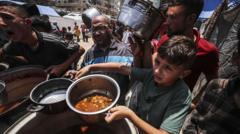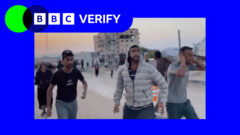The situation in Gaza raises intense ethical and legal questions about warfare and the treatment of civilians, as leaders navigate the consequences of their support or condemnation.**
The Haunting Debate on Accountability in the Israel-Gaza Conflict**

The Haunting Debate on Accountability in the Israel-Gaza Conflict**
As accusations of war crimes against Israel continue to grow, the future of international diplomatic relations hangs in the balance.**
In the midst of mounting accusations of war crimes, Israel is facing a critical juncture that could shape international relations for decades. The central argument revolves around the laws of war, which dictate that even nations retaliating from severe attacks must adhere to humanitarian standards. After Hamas's brutal assault on October 7, 2023, which resulted in the deaths of over 1,200 Israelis, the conflict has escalated, leading to allegations against Israel of severe breaches of these rules.
The Geneva Conventions serve as the foundation of international law, emphasizing the civilized conduct of warfare, particularly in protecting civilians amidst hostilities. Yet, the ongoing war has blurred these lines, leading to a tragic humanitarian situation in Gaza.
The inability to gather reliable information in the war zone complicates the narrative. With the deaths of 181 journalists reported, and limitations imposed on international media by Israeli authorities, the grim reality of civilian casualties remains difficult to ascertain accurately. The ICRC stands at the center of this legal dilemma, guarding the principles of the Geneva Conventions while confronting blatant violations.
High-profile conversations among legal experts, humanitarians, and diplomats reveal a growing frustration with Israel's military strategies and their potential ramifications for international law. As allegations of genocide accumulate against Israel, Prime Minister Netanyahu’s administration is scrutinized not only for its military tactics but also for its political maneuvers that many believe aim to secure his own government’s stability.
The statistics detailing the human cost of the conflict paint a harrowing picture, with tens of thousands of Palestinian deaths reported, highlighting the devastating impact of warfare on civilian populations. Moreover, accusations of starvation being employed as a tactic in warfare have intensified criticism from various countries, triggering calls for immediate action to halt the violence.
Interviews with ICRC president Mirjana Spoljaric underscore the gravity of the situation, as she candidly states that humanity is failing in Gaza. The Obsession with historical grievances, marked by centuries of persecution echoed by Netanyahu, complicates the narrative and creates a polarized dialogue regarding the legitimacy of Israel's actions.
As voices of dissent grow louder within allied nations, the risk of diplomatic fallout becomes increasingly palpable. Conversations are shifting towards potential sanctions and the recognition of Palestine, as allies reassess their unwavering support of Israeli policy amidst these heartbreaking circumstances.
With rising tensions and complexities surrounding accusations against Netanyahu and his cabinet following warrants for war crimes, the landscape of international support is shifting. More than just a regional conflict, the implications of this war reach far beyond borders, challenging the global community to confront the moral and legal standards of warfare.
In closing, this tumultuous chapter in the Israel-Gaza conflict may not only rewrite the future of the region but also redefine the rules that govern warfare in a rapidly evolving world. The international community continues to grapple with questions that demand urgent answers, as accusations of inhumanity echo louder with each passing day.



















